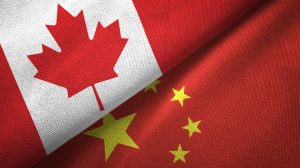Undeclared donations to political candidates, disinformation campaigns, and diplomats boasting about how they managed to defeat candidates deemed unfriendly: These actions did not take place at the height of the Cold War or in a spy movie, but rather in the lead up to Canada’s federal parliamentary elections in 2021. Reports that China interfered in Canada’s elections should raise concern for Americans about the potential for future cooperation with Canada to combat China.
In mid-February, a report leaked from the Canadian Security Intelligence Service (CSIS) found that China had interfered in Canada’s election in 2021. The findings were shared with the Five Eyes countries — Australia, Canada, New Zealand, the U.K., and the U.S. — as well as the German and French intelligence services. Currently, there is no evidence that the election was compromised by this interference.
China’s goals in Canada’s 2021 election were two-pronged. First, Beijing aimed to prevent the election of certain members of the Conservative Party of Canada deemed unfriendly to China. Second, they aimed to support a Liberal minority government in Parliament, to both defeat the Conservatives and limit their ability to pass legislation. According to reporting by the Globe and Mail, an unnamed source at a Chinese consular mission in Canada said, “Beijing likes it when the parties in Parliament are fighting with each other, whereas if there is a majority, the party in power can easily implement policies that do not favor the PRC.”
China’s tactics included deploying disinformation campaigns and undisclosed cash donations to political candidates, often working through the United Front Work Department, a Chinese Communist Party organization that undertakes influence operations both in China and internationally.
After failing to take action for days, Prime Minister Justin Trudeau’s announcement that he will appoint a special rapporteur to examine foreign interference in the 2021 elections on March 6 is a good first step but fails to consider the broader strategic implications of China’s actions. If China’s interference was able to alter the election to its preferred outcome, the potential for the United States and Canada to develop a unified and allied strategy to combat China may have been diminished. This poses a major concern for the U.S., as countering China, a country described as intent on reshaping the international order by the U.S. government, is a crucial goal for Washington.
Canada has only recently moved to take concrete steps against potentially harmful actions from China, deciding to ban Huawei infrastructure across the country and TikTok from government phones.
Canada’s policy missteps in responding to the threat posed by China are concerning, but a more pressing issue for U.S. policymakers is the comfort China has demonstrated in exploiting these shortcomings. For example, the federal government’s awarded a contract to Hytera to build communications infrastructure for the Royal Canadian Mounted Police, despite Hytera having ties to the CCP and facing espionage charges in the United States.
In responding to global challenges, it is necessary to draw strength from coordination with allies and partners. An example of this can be seen in the unified response the West has taken against Russia’s invasion of Ukraine, working in lockstep to enact and enforce sanctions and deliver weapons. On China, the United States has moved with its allies, Japan, and the Netherlands to limit equipment sent to China for advanced semiconductor manufacturing. The U.S., Japan, and the Netherlands are all home to significant manufacturers of this kind of advanced machinery. The United States originally announced unilateral measures against equipment exports to China. A major concern at the time was that by not ensuring buy-in by allies, the U.S. would fail to stem the flow of equipment to China.
As the threat from China continues to increase, the U.S. must be prepared to work with its allies to develop strategies and take collective action. If future instances of Chinese government influence campaigns are successful, partners such as Canada may be limited in working with the U.S. in developing policy responses. China’s attempts in 2021 to silence voices it deemed too harsh and to limit the operational ability of Canada’s governing party by working to ensure a minority government could very feasibly work to limit the passage of legislation or policy decisions.
China’s actions and a lack of an appropriate response from Ottawa should give Washington pause before counting on Canadian support in countering Beijing. There are, however, actions the United States can take to assist Canada in countering China.
The U.S. is no stranger to foreign interference in its own elections, with Russia’s blatant meddling in 2016 resulting in the Muller Report and widespread public disclosures. Raising public awareness of Russia’s actions in 2016 allowed the public to better understand the threat of foreign interference in 2020. In contrast, Trudeau has only announced the forthcoming appointment of a special rapporteur, who could recommend a public inquiry if they chose to. The U.S. should seek to underscore the importance of a public inquiry with Canadian leaders and share other lessons learned.
It is up to Canada to get its own house in order, but the United States should position itself as a willing partner to help Canada in getting there. A Canadian government that has taken serious efforts to protect itself against Chinese interference makes for a better ally for the U.S. in an era of great power competition.

































